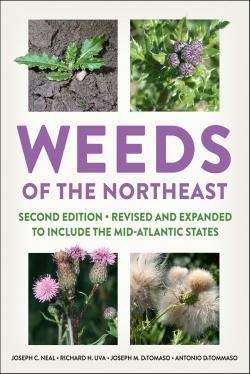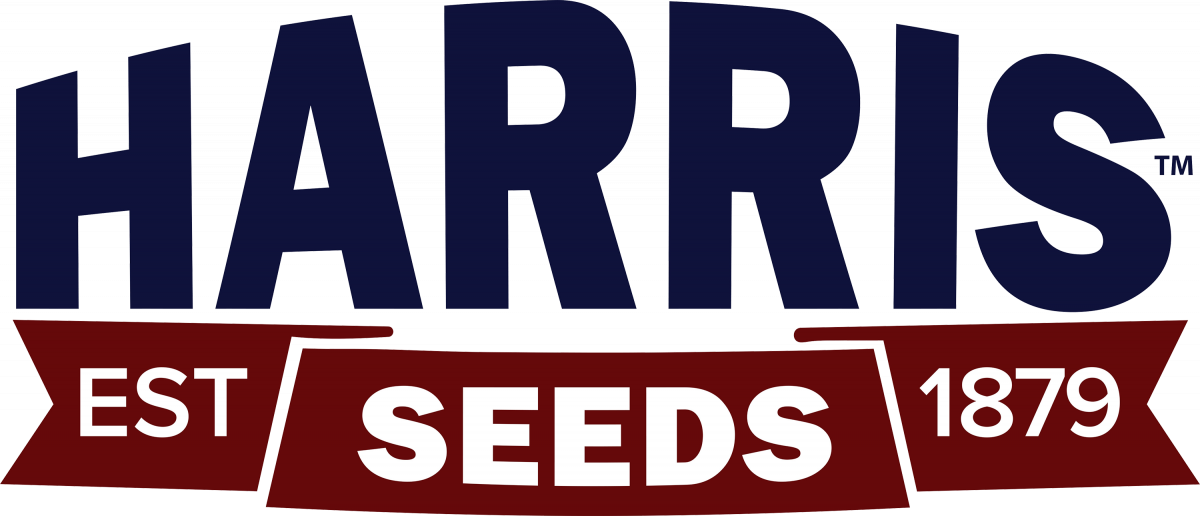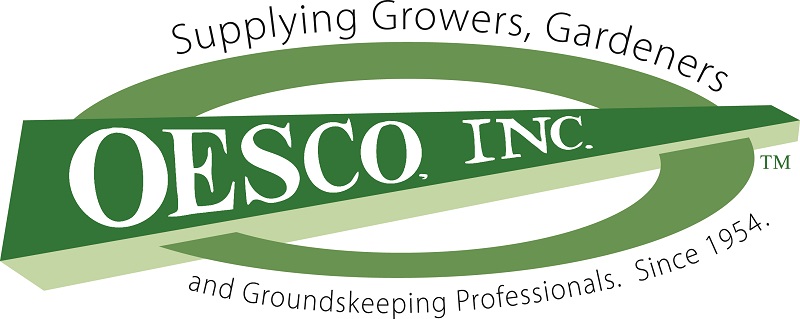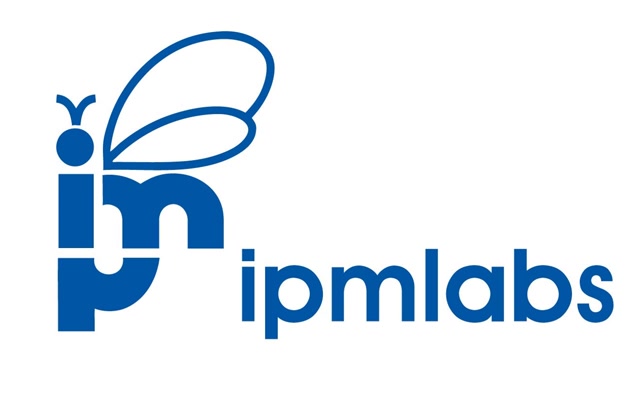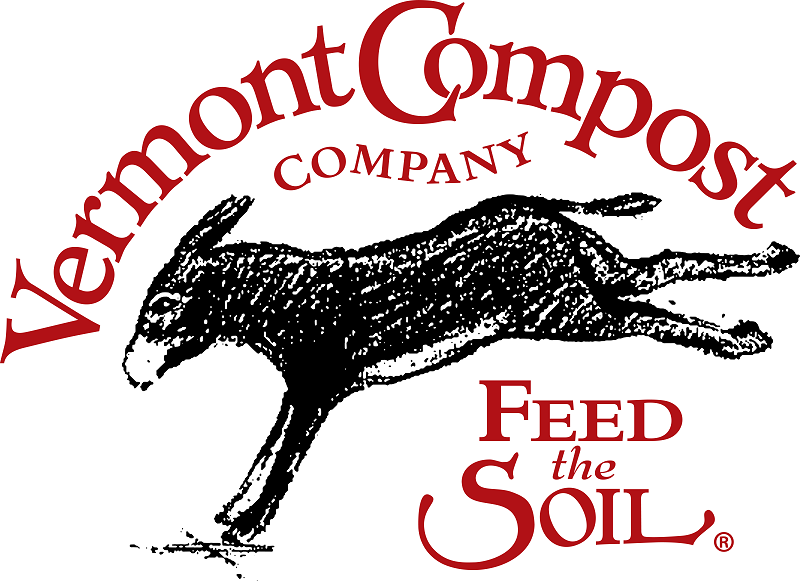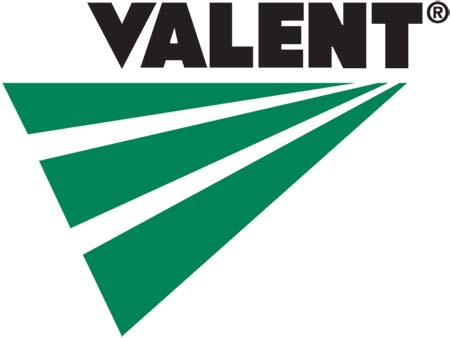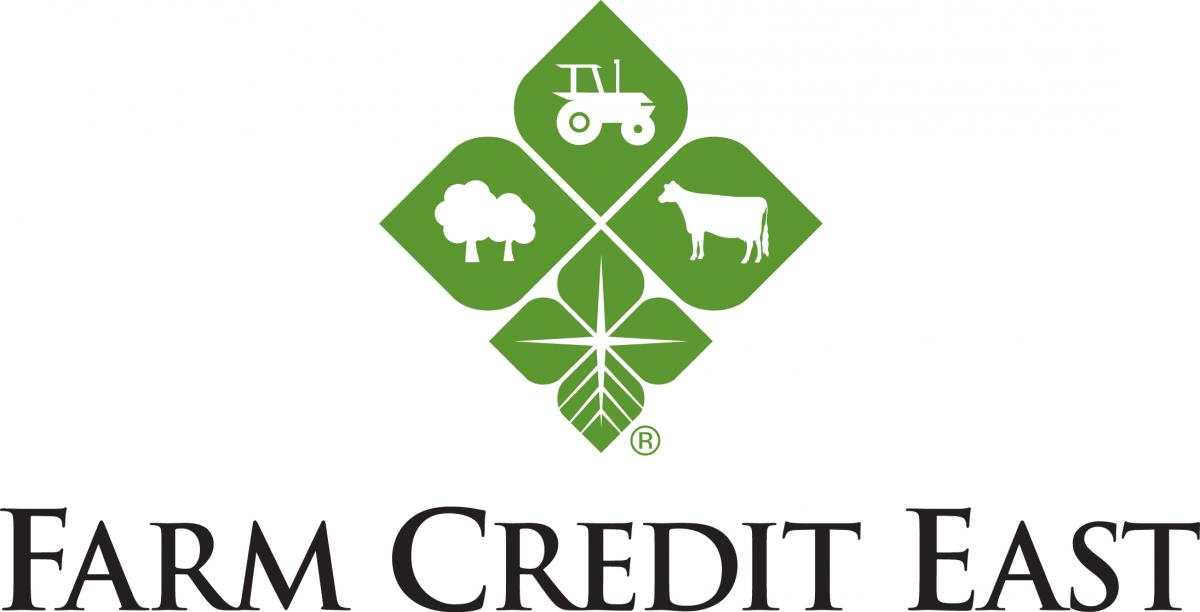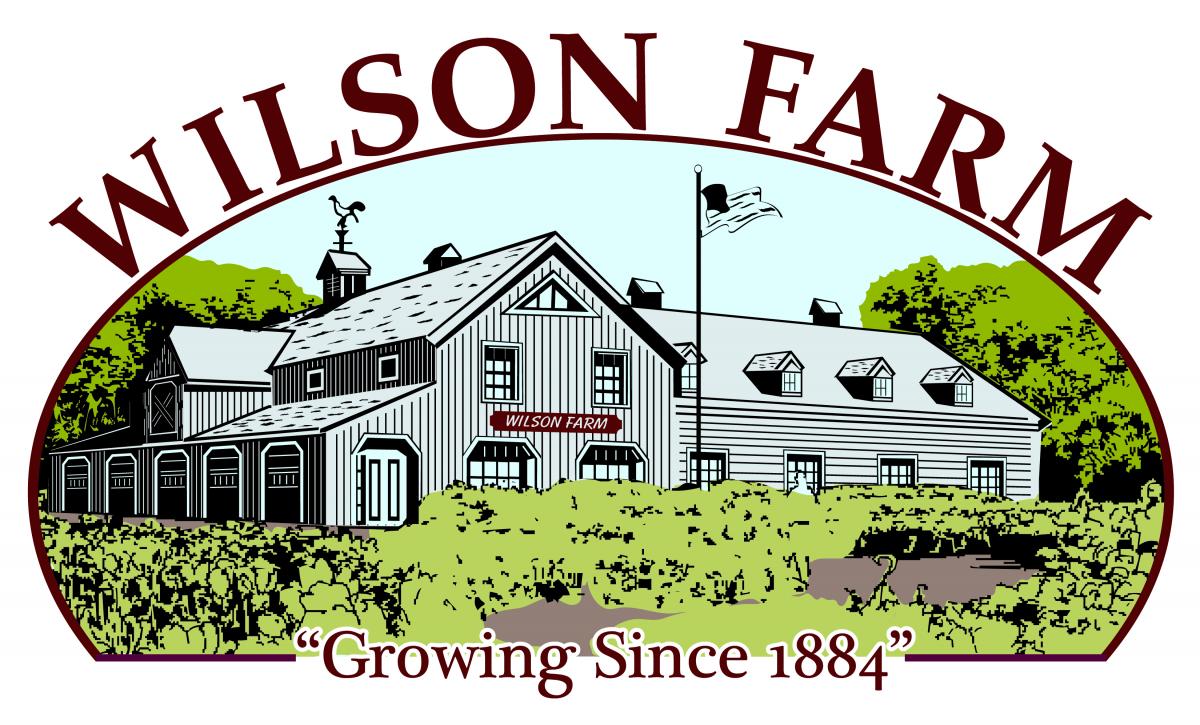To print this issue, either press CTRL/CMD + P or right click on the page and choose Print from the pop-up menu.
Click on images to enlarge.

Crop Conditions
 Rain and snow over the last few weeks may have helped to alleviate the state’s drought situation, though Wednesday’s storm that brought 1-3 inches of rain and strong winds to most parts of the state led to flooding and power outages in the hardest-hit locations in Eastern MA.
Rain and snow over the last few weeks may have helped to alleviate the state’s drought situation, though Wednesday’s storm that brought 1-3 inches of rain and strong winds to most parts of the state led to flooding and power outages in the hardest-hit locations in Eastern MA.
Folks are still busy out there! While Thanksgiving may historically have been the time that vegetable farms were put to bed until the spring, the proliferation of winter farmers’ markets—nearly 50 according to this map—and CSAs with winter shares, along with tunnels filled with spinach and other greens, mean there is still a lot of locally-produced food getting sold and distributed out there. We’re hoping some of you can take some time away to join us at the New England Vegetable & Fruit Conference in Manchester, NH next week. You’re sure to see a lot of familiar faces and pick up some great information to help you with your crop planning for next year! And if you’re looking for gift ideas, see below for a few offerings from UMass, along with some of the Vegetable Team staff’s helpful resource picks.
Contact Us
Contact the UMass Extension Vegetable Program with your farm-related questions, any time of the year. We always do our best to respond to all inquiries.
Vegetable Program: 413-577-3976, umassveg@umass.edu
Staff Directory: https://ag.umass.edu/vegetable/faculty-staff
Home Gardeners: Please contact the UMass GreenInfo Help Line with home gardening and homesteading questions, at greeninfo@umext.umass.edu.
Holiday Gift Ideas from UMass Extension
Looking for a great gift for a farmer, gardener or plant-lover? Try one of these offerings from UMass Extension!
2025 UMass Garden Calendar
Order here! Cost is $14.50 plus shipping
Order by December 12th for best chance of delivery by Christmas (meets USPS recommended send-by date). Orders placed after that date may be delayed due to high shipping and mail volumes.
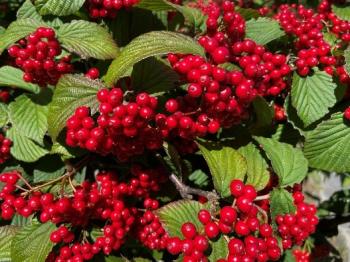 UMass Extension works with the citizens of Massachusetts to help you make sound choices about growing, planting, and maintaining plants in our landscapes, including vegetables, backyard fruits, and ornamental plants. Our 2025 calendar continues UMass Extension’s tradition of providing gardeners with useful and practical information. Many people also love the daily tips and find the daily sunrise/sunset times highly useful!
UMass Extension works with the citizens of Massachusetts to help you make sound choices about growing, planting, and maintaining plants in our landscapes, including vegetables, backyard fruits, and ornamental plants. Our 2025 calendar continues UMass Extension’s tradition of providing gardeners with useful and practical information. Many people also love the daily tips and find the daily sunrise/sunset times highly useful!
As always, each month features:
- An inspiring garden image.
- Daily gardening tips for Northeast growing conditions.
- Daily sunrise and sunset times.
- Phases of the moon.
- Plenty of room for notes.
- Low gloss paper for easy writing
Soil Test Gift Kit
Order here! Each gift kit is $27.00 and includes the cost of a routine soil test with fertility recommendations ($20), a soil organic matter test ($6), and postage and handling ($1)
Each gift kit includes directions for collecting and submitting a sample, a sample bag, and a sample envelope (not pre-paid) to return the sample once it is collected. The gift kit will be mailed back to you, the gift giver, in a mailer envelope. Inside the mailer, each kit will be in an envelope suitable for gifting. We are not able to ship to a gift receiver, so please leave a week for us to mail the kit to you after we receive your order, plus time for you to get it to your lucky person.
This offer is only available through 12/31/24. To purchase your gift kit, please use the Soil Test Gift Kit Order Form. Additional information on fulfillment is included on the form.
2025-2026 New England Vegetable Management Guide
Coming soon! Order here when available—these are on their way from the printer and will be available to purchase as soon as they arrive. Cost is $40.00 plus shipping. The Guide can be purchased on its own or in combination with the Northeast Vegetable & Strawberry Pest ID photo guide for $50.
The New England Vegetable Management Guide is a comprehensive guide to current production and pest management techniques for commercial vegetable crops. There are in-depth sections on cultural practices, vegetable transplant production, integrated pest management for insects, weeds and diseases, and on individual vegetable crops. A web-based version can also be accessed here: http://www.nevegetable.org.
Additional Recommended Reading
Here are some of our other favorites if you're looking for more gifts or resources!
- Building Soils for Better Crops, 3rd Edition
- Managing Cover Crops Profitably, 3rd Edition
- Techniques for Tomato Grafting - Purdue Extension
- How to Splice Graft Cucumber Plants - Purdue Extension
Storage
Insect Pest Management
- Handbook of Vegetable Pests, by John Capinera
- Farming With Native Beneficial Insects, Xerces Society
- Resource Guide for Organic Insect and Disease Management—Review of OMRI-listed pesticides and their efficacy
- New York State Integrated Pest Management Organic Guides—Crop by crop pest mgmt. tips and review of OMRI-listed pesticide efficacy
Weed Management
- Weeds of the Northeast, by Richard Uva, Joseph Neal, and Joseph DiTomaso
- Manage Weeds On Your Farm, by Charles L. Mohler, John R. Teasdale, Antonio DiTommaso
Business Management
Hot Water Seed Treatment
Some plant pathogens, including specific fungal, oomycete, bacterial, and viral pathogens, can be carried on seed; some can only infest the seed surface and others are able to penetrate the seed coat and survive within the seed. In both cases, when the seed is planted, the pathogen can grow along with the seed, resulting in an infected plant. Therefore, starting with disease-free seed is an important step towards growing disease-free crops. Seeds can be treated with chlorine or pesticides to eliminate pathogens that are associated with the surface of seeds. However, these treatments cannot penetrate the seed coat, and therefore leave internal pathogens untouched. Hot water can penetrate the seed coat and kill pathogens without the use of pesticides, making it a useful tool for managing seed-borne diseases. With the right tools, growers can hot water treat seeds effectively at home. Additionally, we offer a hot water seed treatment service through the UMass Extension Vegetable Program. This article includes instructions on treating your own seed as well as information on how to submit seeds to be treated.
Treating your seeds with hot water can help prevent the establishment of seed-borne diseases on your farm, or prevent their reintroduction year after year. However, while hot water seed treatment (HWST) will kill pathogens on and within your seeds, it does not prevent reinfection and does not guarantee disease-free crops. Plant diseases can spread via wind, water, and insects throughout the growing season. Crop rotation and field sanitation are key for preventing the spread of diseases, regardless of whether you hot water treat your seed.
HWST also has the beneficial effect of priming seeds, resulting in faster germination than untreated seed. However, the treatment can decrease germination rates, especially of older seed (more than 1 year old) or seeds that were grown under stressful environmental conditions. Treated seed does not remain viable for as long as untreated seed and should be planted during the growing season immediately following treatment.
Deciding which seeds to treat
- Determine the likelihood that seed-borne pathogens are present based on the seed (see Table 1 for the seed-borne diseases affecting different crops). If you are saving your own seed and diagnosed one of the diseases in Table 1 in your crop, you should hot water treat that seed. If you buy in seed, it can be harder to determine if HWST is necessary. Tomato, pepper, and brassicas are good candidates for hot water seed treatment because there are common bacterial and fungal diseases of these small-seeded crops that can be easily killed through treatment. Having a conversation with your seed supplier is also a good idea: ask them if the seed was produced in a way to minimize exposure to seed-borne pathogens and if the seed was tested for their presence. Find out if the seed has already been treated with hot water or if it has been primed (pre-soaked to promote earlier and more uniform germination), as treating again could adversely affect the seed. Only a few companies routinely hot-water treat seeds—many are reluctant because there is a risk that germination rate will drop if the water is too hot or if the seeds were already exposed to stressful environmental conditions.
- Don’t treat seed that has a fungicide or insecticide treatment coating, or pelleted seed, as the treatments or pelleting will wash off during treatment and the water bath will be contaminated with pesticides.
- Treat only the seeds that you will use next season. HWST reduces the shelf-life of seeds, so don’t treat seeds that you plan to seed more than a year in the future.
- Don’t treat old seed. Treat only seeds that were produced for the current growing season. HWST is more likely to decrease the germination of old seed.
- Large-seeded crops (beans, cucurbits, peas, corn etc.) are usually not effectively disinfested with hot water treatment because the temperature required to heat the whole seed would kill the outer seed tissue and the seed will not germinate. In some cases, hot water has been used to disinfect just the surface of larger seeds, for example when treating anthracnose on beans.
| Crop | Temp. | Time | Diseases Controlled |
|---|---|---|---|
| Broccoli | 122°F | 20 minutes | Alternaria leaf spot, Bacterial leaf spot, Black leg, Black rot |
| Brussels sprouts | 122°F | 25 minutes | |
| Cabbage | 122°F | 25 minutes | |
| Collards | 122°F | 20 minutes | |
| Kale | 122°F | 20 minutes | |
| Carrot | 122°F | 20 minutes | Alternaria leaf blight, Bacterial leaf blight, Cercospora leaf spot, Crater rot/foliar blight |
| Celery/Celeriac | 118°F | 30 minutes | Bacterial leaf spot, Cercospora leaf spot, Septoria leaf spot, Phoma crown and root rot |
| Eggplant | 122°F | 25 minutes | Anthracnose, Early blight, Phomopsis, Verticillium wilt |
| Lettuce | 118°F | 30 minutes | Anthracnose, Bacterial leaf spot, Lettuce mosaic virus, Septoria leaf spot, Verticillium wilt |
| Onion | 122°F | 20 minutes | Purple blotch, Stemphylium leaf blight, Basal rot, Botrytis blight, Smudge, Black mold, Downy mildew |
| Pepper | 125°F | 30 minutes | Anthracnose, Bacterial leaf spot, Cucumber mosaic virus, Pepper mild mosaic virus, Tobacco mosaic virus, Tomato mosaic virus |
| Parsley | 122°F | 30 minutes | Bacterial leaf blight, Alternaria leaf blight, Black rot, Cercosporoid leaf blight, Septoria blight |
| Spinach | 122°F | 25 minutes | Anthracnose, Cladosporium leaf spot, Cucumber mosaic virus, Downy mildew, Fusarium wilt, Stemphylium leaf spot, Verticillium wilt |
| Tomato | 122°F | 25 minutes | Alfalfa mosaic virus, Anthracnose, Bacterial canker, Bacterial speck, Bacterial spot, Cucumber mosaic virus, Early blight, Fusarium wilt, Leaf mold, Septoria leaf spot, Tomato mosaic virus, Verticillium wilt, Double virus streak |
| Source: “Managing Pathogens Inside Seed with Hot Water” – Meg McGrath, Cornell University Long Island Horticultural Research & Extension Center | |||
Treatment procedure
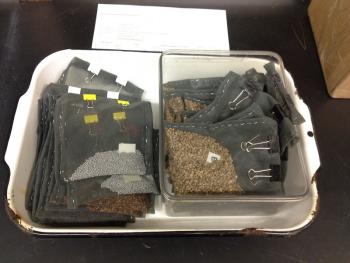 The general protocol for seed treatment is the same across all crops, with just the water temperature and treatment time varying depending on the crop. The temperature of water for treating seed varies from 115 to 125°F, and the treatment period varies from 10 to 60 minutes. See Table 1 for treatment times and temperatures for different crops. It is important to use the appropriate protocol for each crop to control pathogens without damaging the seed; a difference of just a few degrees can either damage your seed or fail to kill pathogens. While hot water seed treatment can be done effectively on a stovetop in a large pot with an accurate thermometer and careful temperature control, it is easier and safer to use precision water baths which provide an even, stable, and accurate temperature.
The general protocol for seed treatment is the same across all crops, with just the water temperature and treatment time varying depending on the crop. The temperature of water for treating seed varies from 115 to 125°F, and the treatment period varies from 10 to 60 minutes. See Table 1 for treatment times and temperatures for different crops. It is important to use the appropriate protocol for each crop to control pathogens without damaging the seed; a difference of just a few degrees can either damage your seed or fail to kill pathogens. While hot water seed treatment can be done effectively on a stovetop in a large pot with an accurate thermometer and careful temperature control, it is easier and safer to use precision water baths which provide an even, stable, and accurate temperature.
Before you treat all of your seed, you may want to conduct a seed germination test, as different varieties and seed lots may react differently to hot water treatment. Treat a 50- or 100-seed sample using the procedure below, then test the germination of both the treated seeds and an equal number of untreated seeds, either in the same growing medium that you plan to use for transplant production, or in a moist paper towel. If the test gives acceptable germination rates, treat as much seed as you expect to use in the coming season.
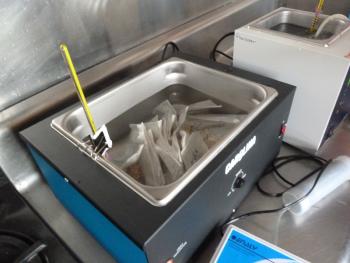 Preheat water baths. Heat one bath to 100°F and another to your treatment temperature. The first bath will be used to preheat the seed so that the temperature of the treatment bath doesn’t drop significantly when the seeds are added. Heat enough water to allow water to move around seeds freely. We treat about 0.5 liters of seed at a time in our six-liter water bath. Use an accurate laboratory thermometer. It is important that the water be maintained at a uniform temperature throughout the bath, that the recommended temperature not be exceeded, and that the seed be treated no longer than the time interval specified. A stirring hot plate helps to provide continuous agitation and uniform water temperature, though it can be done with continuous, consistent manual agitation or an aquarium bubbler. Keep a separate container of room temperature water close by to add, if necessary, to prevent overheating. An immersion circulator (a hand-held water heater used for the sous vide cooking method) is a great tool for treating your own seed.
Preheat water baths. Heat one bath to 100°F and another to your treatment temperature. The first bath will be used to preheat the seed so that the temperature of the treatment bath doesn’t drop significantly when the seeds are added. Heat enough water to allow water to move around seeds freely. We treat about 0.5 liters of seed at a time in our six-liter water bath. Use an accurate laboratory thermometer. It is important that the water be maintained at a uniform temperature throughout the bath, that the recommended temperature not be exceeded, and that the seed be treated no longer than the time interval specified. A stirring hot plate helps to provide continuous agitation and uniform water temperature, though it can be done with continuous, consistent manual agitation or an aquarium bubbler. Keep a separate container of room temperature water close by to add, if necessary, to prevent overheating. An immersion circulator (a hand-held water heater used for the sous vide cooking method) is a great tool for treating your own seed. - Prepare the seed. Make a packet for the seeds out of cheesecloth, screen, a coffee filter, or insect netting. Fill each packet no more than halfway with seed, to allow for water movement throughout the packet. Include a metal bolt, coin, or other weight to keep the seed submerged. Label all packets, especially if you’re treating more than one variety at once! We label our packets by including a small piece of a plastic transplant tray label tag, labeled with permanent marker inside the packet.
- Pre-heat the seed. Submerge the seed in the pre-heat bath for 10 minutes, constantly checking the temperature to ensure that it does not rise above 100°F.
- Treat the seed. Move the seed to the treatment bath and treat for the recommended amount of time. Again, check the temperature constantly to ensure that it does not rise above the recommended temperature. Remove the seeds promptly and run them under room temperature tap water to cool them.
- Dry the seed. Pat dry with towels, then air dry at 70 to 75°F by spreading the seed on dry paper towels. We leave treated seeds in their mesh packets and dry them in a simple food dehydrator on fan only to dry the seeds quickly. Make sure there is no added heat! Not all dehydrators have this option—check before you buy) to dry the seeds quickly.
Equipment: There are many options for water bath equipment; cheaper options likely require you to watch and adjust the temperature constantly where more expensive options may be more precise and hands-off. Stirring hot plates start at about $400. Both analog and digital precision water baths run at about $700 minimum. Laboratory thermometers are about $15. There are many brands of sous vide immersion circulators that sell for $50-100.
UMass Hot Water Seed Treatment Service: If the procedure above sounds daunting or you’re not sure you want to invest in hot water treatment equipment, we can treat your seed for you! We are only able to treat seed that will be used by the submitter—we cannot treat seed that will be resold or distributed. Submissions are treated and returned to the submitter within 10 days of receipt. If you are sending in seeds for treatment, please email us at umassveg@umass.edu ahead of time so we know to expect them.
Click here to submit a hot water seed treatment sample
--UMass Extension Vegetable Program
News
Organic Certification Cost Share Program
Reminder to certified organic growers, the 2024 Organic Cost Share Reimbursement application period is open and deadline to submit applications is December 16, 2024.
MDAR is authorized by the USDA – Agricultural Marketing Service (AMS) to reimburse certified Organic Crop and Livestock Producers and Handlers (processors) for the Federal 2024 Fiscal Year. Reimbursements are limited to 75% (seventy-five percent) of an operation’s certification costs, up to a maximum of $750 (seven hundred fifty dollars) of certification, for the program year. Organic operations that are certified for crops, wild crops, livestock and handlers are eligible to participate.
If you would like to be listed on the MassGrown Map as an Organic Farm, please fill out MDAR’s Map Form. For those already on the Map who have updates or edits for your farm, please send them to Richard.LeBlanc@mass.gov.
New Northeast SARE Historically Underserved Farming Communities Grant Program
Applications due: Tuesday, January 7, by 5pm
The historically underserved farmer/farming communities grant program is designed to address systemic/structural barriers to access that disproportionately limit the ability of historically underserved farmer/farming communities to fully participate in SARE programs.
This grant program funds projects that create farming and food system opportunities for historically underserved farmers/farming communities and prioritizes work that engages, and is led by, people with experience from those communities. The program seeks projects that will address the needs and serve the interests of groups that have been met with discrimination and other systemic obstacles to full participation in the agricultural system of the Northeast.
Northeast SARE defines Historically Underserved Farmers in alignment with the USDA definition of socially disadvantaged farmers and ranchers, i.e. those belonging to groups that have been subject to racial or ethnic prejudice, including but not limited to farmers who are Black or African American, American Indian or Alaska Native, Hispanic or Latino, and Asian or Pacific Islander.
Awards can range from $150,000 to $250,000 depending upon a project’s needs, complexity, and duration. Approximately 15-20 awards will be made.
A wide variety of topics can be funded by this grant program - for a list of topics, click here.
Questions? Contact ne-huf@sare.org.
MDAR Climate Smart Agriculture Program Round II – Applications due January 7
Program website: https://www.mass.gov/how-to/how-to-apply-to-the-climate-smart-agriculture-program
Applications due: Tuesday, January 7, 2025, 4pm
MDAR is now accepting applications from agricultural operations who wish to participate in the Climate Smart for Agriculture Program (CSAP).
The CSAP grant seeks to support farmers in adapting to changing climate conditions through practices that improve soil health, ensure the efficient use of water, prevent impacts on water quality, reduce energy use and reduce the use of fossil fuels, while also encouraging the use of innovative technologies that improve resource efficiency. It aims to strengthen local food systems, improve farm productivity, and ensure long-term sustainability, all while reducing the environmental footprint of agriculture.
CSAP is a competitive, reimbursement grant program that funds projects 80% of total project costs up to a maximum of $50,000. This round of funding is for projects that can be completed in a short timeframe and are able to be completed by June 30, 2025.
NOTE: Applicants who submitted proposals under the first round of CSAP are eligible to apply but cannot submit an application for the same project.
Please refer to program website to download a copy of the Request for Response (RFR), which contains eligibility information, project examples, and the questions that are included in the online application. Applications must be submitted through the online application to be considered.
Questions? Contact Laura Maul at Laura.Maul@mass.gov or (857) 507-5972
FSA Marketing Assistance for Specialty Crops (MASC)
Applications due: Wednesday, January 8, 2025
The Marketing Assistance for Specialty Crops (MASC) program provides financial assistance to specialty crop producers to help them expand domestic markets or develop new markets for their crops. MASC helps specialty crop producers offset higher marketing costs related to:
- Tenderness and perishability of specialty crops like fruits, vegetables, floriculture, nursery crops and herbs
- Specialized handling and transport equipment with temperature and humidity control
- Packaging to prevent damage
- Moving perishables to market quickly
- Higher labor costs
For more information on eligibility, application, and payment, visit the program website here.
Apply to the 2025 Urban Ag Mentor Farm Program!
Applications due: Wednesday, January 15 at 11:59pm.
UMass Extension will work with 3 urban farms across the state to provide tailored and sustained technical assistance to help them tackle their most challenging issues over the course of the year. Through the program, UMass can provide resources and consultations on topics, such as soil health, pest management, organic growing practices. Mentor farms then share the knowledge they gain with their staff and the larger urban ag community. In addition to one-on-one technical assistance, participating farms receive a small stipend and funding for things like soil testing and plant disease diagnostics.
Who can apply?
Any organization or individual that considers themselves an urban farm or an urban farmer (for-profit and non-profit urban farms are both eligible)
To find out more and to apply, click HERE!
Questions? Please email urbanag@umass.edu.
UMass Extension is grateful for support of this initiative by the National Institute of Food and Agriculture, U.S. Department of Agriculture, through the Northeast Sustainable Agriculture Research and Education (Northeast SARE(link is external)) program under subaward number SNE23-004-MA-AWD00001024.
Events
New England Vegetable & Fruit Conference
When: Tuesday - Thursday, December 17-19, 2024, 8am-6pm daily
Where: Doubletree Hotel, 700 Elm St., Manchester, NH 03101
Registration: $145/person, or $115 for additional attendees if registering as a group. Students $70. Registration capped at 1,400. Click here to register.
The NEVF Conference includes more than 25 educational sessions over three days, covering major vegetable, berry and tree fruit crops as well as various special topics. A Farmer-to-Farmer meeting after each morning and afternoon session will bring speakers and farmers together for informal, in-depth discussions on certain issues. The extensive trade show has over 120 exhibitors.
610th Meeting of the New England Vegetable & Berry Growers’ Association
When: Friday, January 3, 2025, 9am-3:15pm
Where: Blue Bonnet Diner, Northampton, MA
Registration: $25 registration fee, waived for NEVBGA members. Lunch buffet is an additional $25. To register, call/text 978-423-6694 or email secretary@nevbga.org by December 30.
The New England Vegetable & Berry Growers Association (NEVBGA) is the oldest vegetable growers association in America. We support and promote the vegetable and berry industry in New England. The NEVBGA hosts a series of winter grower meetings each year as an opportunity for growers to learn about ongoing research projects, variety trials, new equipment, growing techniques, and business topics to strengthen their businesses. Winter meetings are open to all!
Agenda
- 9am: Registration
- 9:30am: Biomass allocation an decomposition pattern of roots and shoots of three summer cover crops – Dr. Masoud Hashemi, Extension Professor, UMass Stockbridge School of Agriculture
- 10:15: Sweet Corn & Pumpkin Variety Trial Results - Dr. Mark Hutton, Associate Professor of Vegetable Crops and Extension Vegetable Specialist, UMaine
- 11:00am: The Future of Berry Plant Business – Amanda Emond Sales Manager, Nourse Farm, Whately, MA
- 12pm: LUNCH & Commercial Member introductions, Extension updates, NEVBGA updates
- 1:15pm: Ag Water and Traceability Rules – Lisa McKeag, UMass Extension Produce Safety Specialist
- 1:45pm: Herbicide Update - Dr. Maria Gannett, UMass Extension Weeds Specialist
- 2:30pm: Avoiding Landfills – A Look at Plastic Use in Agriculture and the Avenues for Disposal - John Gove
- 3:15 Adjourn
- 1 pesticide recertification credit has been approved for this meeting.
2025 CT Vegetable & Small Fruit Growers’ Conference
When: Tuesday, January 7, 2025
Where: UConn Student Union Ballroom, Room 330, Storrs, CT
Registration: $50 before December 30, $70 on/after December 30, students $35. Lunch and parking included. Register by January 5 to receive free parking. Click here to register.
Join UConn Extension at their annual Vegetable and Small Fruit Growers Conference for an educational day of learning, regulations, and updates on the latest trends in vegetable and small fruit production. There will be trade show held in UConn Student Union, Room 304 throughout conference.
Click here for the full conference agenda.
4 pesticide recertification credits are available.
2025 Get Ready for Spring Greenhouse Education Program, Part 1
When: Tuesday, January 14, 2024, 8:30am-12pm
Where: Online
Registration: $25/person. Click here to register.
Topics:
- A New Option for Controlling Plant Growth with Ethephon Drenches
- Identification and Management Strategies for Bacterial and Fungal Leaf Spots on Spring Greenhouse Crops
- How to Optimize Biocontrol Programs to Ensure Successful Pest Management Outcomes
3 pesticide recertification credits for MA categories 26, 29, 31, and 000 (Applicator’s/Core License) are available for this program.
Gracious support from the Massachusetts Flower Growers Association has reduced participation fees for these events as a benefit to the industry.
Questions? Contact Geoffrey Njue, gnjue@umass.edu, 617-243-1932.
MDAR Financial Planning Workshops
-
Financial Foundations
When: Wednesday, January 15, 2025, 5:30 – 7:30pm
Where: Zoom
Registration: Free! Click here to register.
This webinar is for farm owner/operators and farm managers who want to learn or get a refresher on financial information including how to set up your financial statements, cash flow budgeting, fixed vs. variable expenses, and Cost of Goods Sold. This course, taught by an instructor with agricultural financial and business expertise, will help you with tools to evaluate your farm business for greater efficiency and profitability. Free and open to Massachusetts farmers.
Jacqueline Mastrangelo and Ray Belanger of Fish Park Consulting have worked with farmers across Massachusetts for 20+ years, analyzing their current financial state, training them on how to review financial statements and how to prepare a budget utilizing valid assumptions. They both have an extensive financial background.
-
Reaching Your Market
When: Sunday, January 29, 2025, 5:30 – 7:30pm
Where: Zoom
Registration: Free for MA farmers! Click here to register.
This webinar is for farm owner/operators and managers who want to learn or get a refresher on marketing concepts including identifying who you are trying to reach, what makes your farm stand out, and how to communicate this in your messaging including social media. This course, taught by an instructor with agricultural marketing and business expertise, will help you evaluate what’s working and what’s not to help focus your efforts.
Since 2004 Rose Wilson of Rose Wilson Consulting has been helping farms hone in on their sales and marketing efforts by sharing how to understand your target market—who are they? what makes them tick?—and pairing this knowledge with actionable and measurable marketing strategies to ensure their investment in marketing is well spent.
Questions? Contact Melissa at Melissa.Adams@mass.gov.
UConn Online Vegetable Production Certificate Course
When: January 27 – March 11, 2025. Asynchronous course, to work through at your own pace online.
Where: Online
Registration: $149. Register by January 20, 2025. Click here to register.
UConn Extension is offering a Vegetable Production Certificate Course, designed for new and beginning farmers who have 0-3 years of vegetable growing experience or no formal training in agriculture. The participants will learn answers to the basic questions about farm business planning, planning and preparing for vegetable farm, warm and cool-season vegetable production techniques, season extension, identification of biotic and abiotic issues, and marketing.
Questions? Contact Shuresh Ghimire, Shuresh.Ghimire@uconn.edu, 860-870-6933
MDAR’s Agricultural Business Training Program
This program offers several courses for Massachusetts agricultural enterprises on business planning and farm transfer. Click the links for more information on each course:
When: Dates TBD based on interest. Expected to begin in January 2025.
Where: Location TBD based on interest. Hybrid, with both in-person and virtual classes.
Registration: Click here to fill out an application. $150 per farm for up to two owner/operators. It is important to us that the course fee does not create a barrier to participation. If the fee would prevent you from participating, please contact Melissa to discuss waiving the fee.
A hands-on course to help established farmers develop a farm business plan with financial projections. This course has been approved as a certified USDA Farm Service Agency (FSA) borrower training for financial management. Submit an application to get on the registration list!
Questions? Contact Melissa Adams, Melissa.L.Adams@mass.gov, 857-276-2377.
When: Starting March 2025
Registration: Free. Rolling applications accepted. Apply by January 15 to begin work this spring. See program page for application information, HERE.
This program is for Massachusetts farm owners who have already identified a successor interested in transitioning ownership and management of the farm. Work one-on-one with an experienced planner over the course of a year to set retirement goals and create tangible next steps for the transfer of management and assets. Note that these advisors have experience working with farm operations on business management, financials, and farm transfer. They will not provide legal or tax advice but will help you develop an action plan that identifies concrete next steps to work on with your attorney and/or CPA to make the transfer happen.
An informational webinar will be held on Wednesday, December 11 at 12pm – register here.
Questions? Contact Laura Barley at 857-507-5548 or Laura.Barley@mass.gov.
- Land for Good’s Succession School - seeking participants for winter session in Taunton - Fill out the Interest Form today!
When: Mondays, January 27, February 24, and March 17, 9:30am - 3:30pm
Where: Taunton Public Library (location dependent on sufficient interest)
Registration: $100 per farm. Click here to fill out an interest form.
This is an opportunity for senior generation farmers, with or without identified successors, to talk with peers, learn from advisors, and get support on the challenging process of farm succession and transfer planning. Succession School provides farmers and farming partners with the structured and sustained support to make decisions, engage their families, and organize the legal and financial mechanics of farm succession.
Questions? Contact Deanna at 339-235-0859 or deanna@landforgood.org.
Southeast New England Agriculture Conference & Trade Show
When: Sunday, February 2, 2025
Where: Bristol Aggie High School
Registration: $65. $20 for kids. Sliding scale available. Lunch included. Click here to register.
For 16 years, SEMAP hosted the Agriculture and Food Conference with the goal of bringing farmers and service providers together to share knowledge and learn about innovations in agriculture. In 2024, we partnered with a number of regional organizations to build a more comprehensive and holistic event for our farmers, fishers, market managers, educators, farm workers, and everyone who makes up our local food community. We’re thrilled to have Bristol County Agricultural High School, Buy Fresh Buy Local Cape Cod, Cluck and Trowel Farm, Massachusetts Farm Bureau Federation, NOFA-RI, OASIS on Ballou, Plymouth County Extension 4-H, and Pocasset Pokanoket Land Trust joining us to bring the second annual SNEACTS! This new, collaborative effort will bring together regional farmers and food producers for a day of community and learning around some of the most pressing issues facing our food system.
Sue Scheufele and Lisa McKeag, from UMass Extension, will be at the conference to speak about a new project collaborating with NRCS to fund IPM efforts on farms, and about current postharvest water food safety regulatory requirements, respectively.
Check back here for a full conference schedule.
2025 Mass Aggie Seminar Series
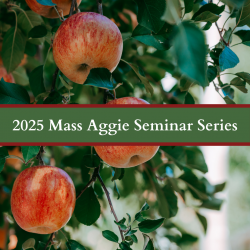 When: Saturdays, February 15 & 22, and March 1, 22 & 29, 10am – 12pm
When: Saturdays, February 15 & 22, and March 1, 22 & 29, 10am – 12pm
Where: Zoom
Registration: $45 for each session. Online registration will close the Friday prior to each seminar. Click here to register, or see the series website, HERE, for information on registering via mail.
The Mass Aggie seminar series is a program for small-scale backyard fruit growers and agricultural enthusiasts of all types that highlights the agricultural expertise and innovation available through the University of Massachusetts Amherst’s Extension Fruit Team. The series provides a platform for small scale backyard growers and agricultural enthusiasts of all types to come together to learn the latest developments in fruit production. Delve into the cutting-edge information shared in our seminars, curated to empower individuals with the tools and knowledge needed to navigate the ever-evolving landscape of agriculture.
- February 15: Insects – Pests and Beneficials – Jaime Piñero
- February 22: Ecological Weed Management in the Home Orchard – Maria Gannett
- March 1: Orchard Sustainability Through IPM – Liz Garofalo
- March 22: Orchard Pruning – Jon Clements
- March 29: Home Orchard Establishment – Jon Clements
See the series website, HERE, for details about each session.
Vegetable Notes. Maria Gannett, Genevieve Higgins, Lisa McKeag, Susan Scheufele, Alireza Shokoohi, co-editors. All photos in this publication are credited to the UMass Extension Vegetable Program unless otherwise noted.
Where trade names or commercial products are used, no company or product endorsement is implied or intended. Always read the label before using any pesticide. The label is the legal document for product use. Disregard any information in this newsletter if it is in conflict with the label.
The University of Massachusetts Extension is an equal opportunity provider and employer, United States Department of Agriculture cooperating. Contact your local Extension office for information on disability accommodations. Contact the State Center Directors Office if you have concerns related to discrimination, 413-545-4800.
